2023 Toyota Crown Review and Test Drive
Pleasing, quiet, and refined inside, the new Crown wears quirky clothes and bears an unusual engineering brief.
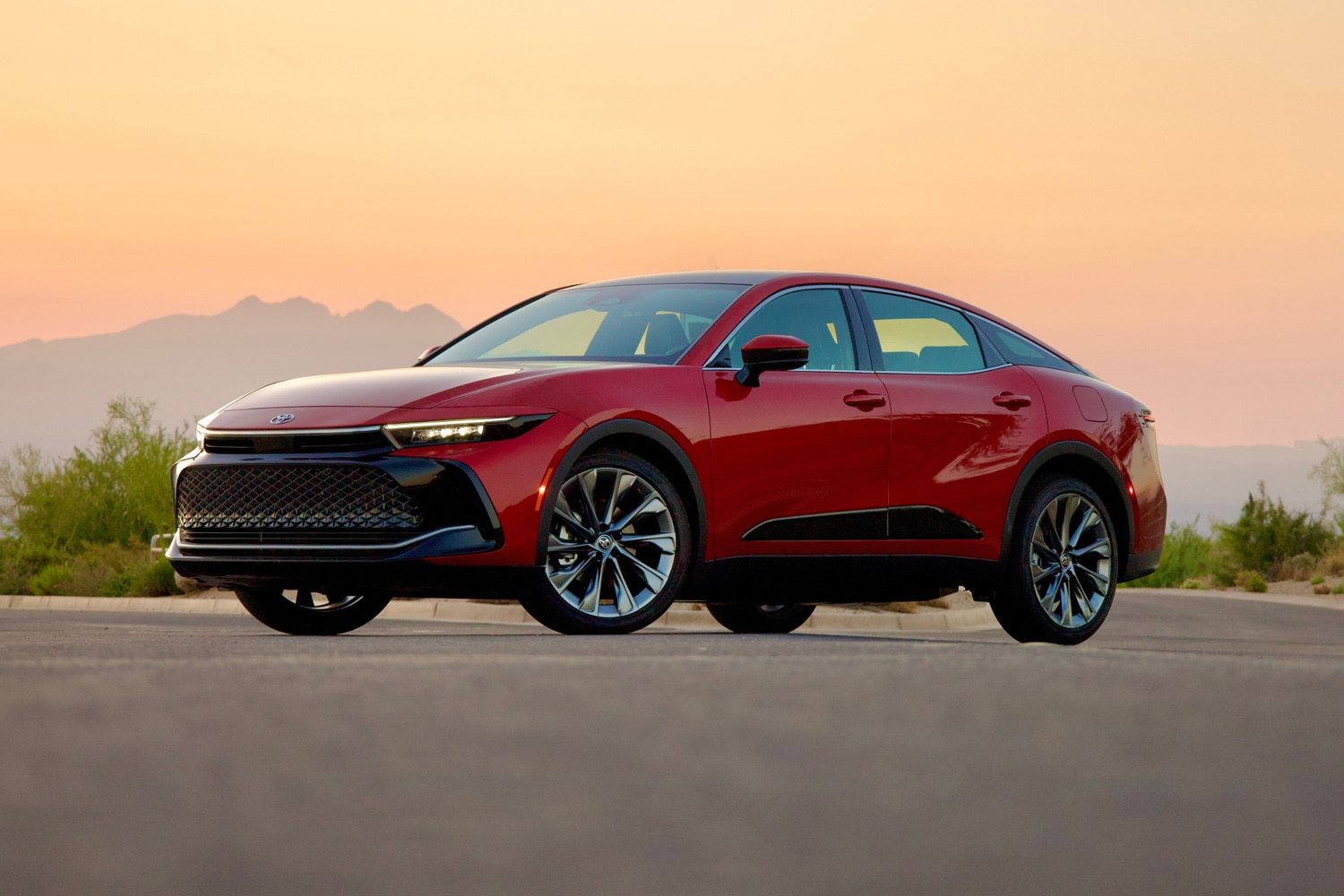 Jim Resnick
Jim Resnick
Toyota's new 2023 Crown sedan debuts this year with a slightly curious purpose. It sits atop the Toyota sedan lineup in price, size, relative luxury, and standard equipment, effectively replacing the canceled Avalon. In addition, the Crown features standard hybrid power and all-wheel drive (AWD). So far, so good. Everything seems normal.
What's odd is the Crown's high ride height, which Toyota says makes it easier to get into and out of the car.
Toyota says customers have been asking for this collection of features in a vehicle, but the Crown isn't the first to tread this territory. In the 1980s, American Motors (AMC) tried selling something similar called the Eagle sedan. More recently, Subaru and Volvo briefly offered high-riding four-door models with a trunk. Honda attempted something new with the Accord Crosstour, but that was a hatchback, not a sedan.
Now we have the 2023 Toyota Crown working with the same recipe but, apparently, a different buyer who wants a crossover SUV that isn't a crossover SUV.
To distinguish its new creation, Toyota gave the Crown a name last used by the automaker in the U.S. market in 1972. The Crown competes with family-sized cars such as the Chevrolet Malibu, Honda Accord, Hyundai Sonata, Kia K5, Nissan Altima, Subaru Legacy, and even Toyota's own Camry sedan. Other rivals include the Chrysler 300, Dodge Charger, Kia Stinger, and Nissan Maxima, but after 2023, these alternatives exit production.
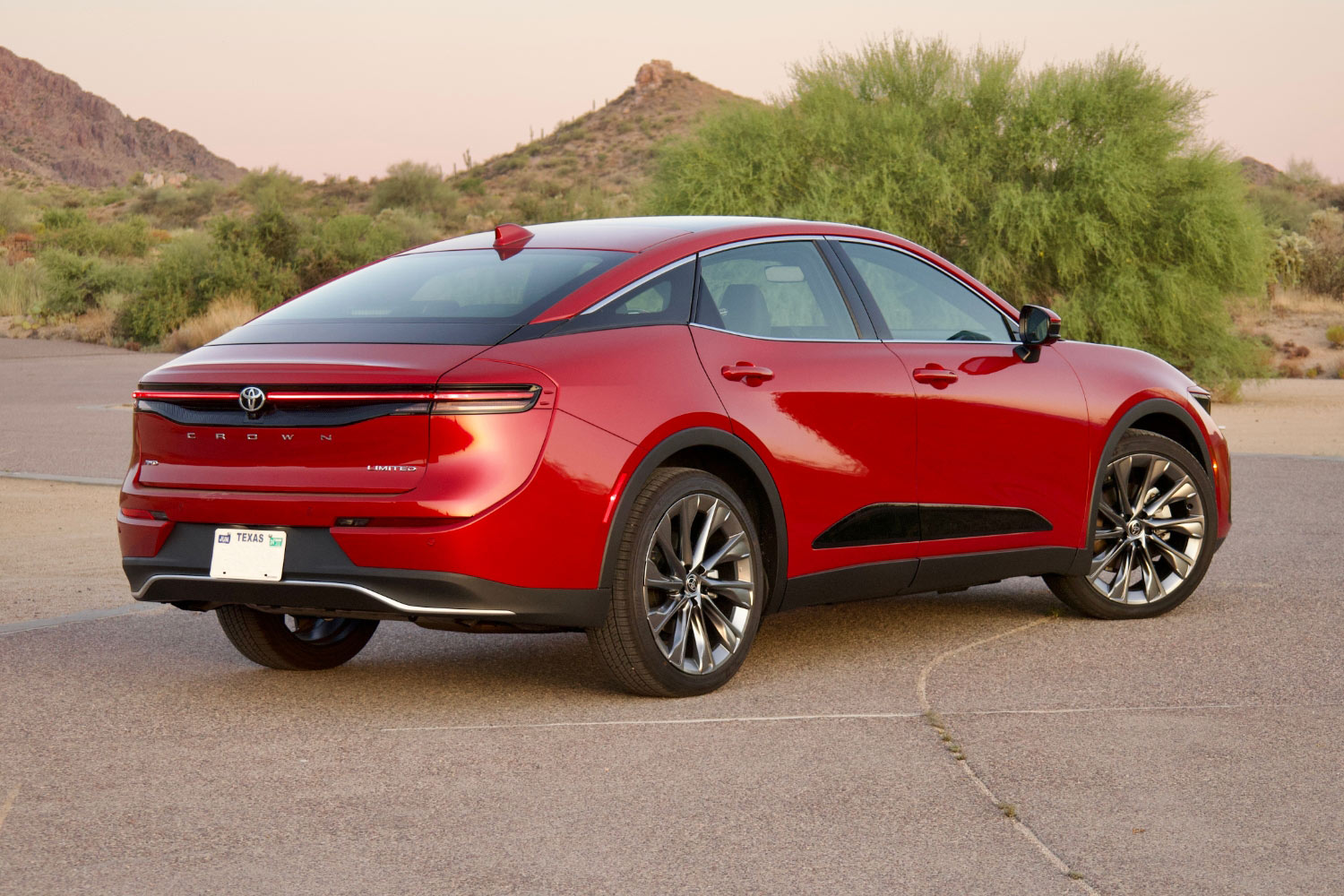 Jim Resnick
Jim Resnick
The 2023 Toyota Crown comes in XLE, Limited, and Platinum trim levels. Base prices range from the low $40,000s to the mid-$50,000s, including the destination charge to ship the car from the Toyota City, Japan, factory that builds it to your local dealership.
For this Crown review, I test-drove the Limited trim with the standard 236-hp drivetrain in Arizona. It came with extra-cost Supersonic Red paint and the Advanced Technology option package, bringing the manufacturer's suggested retail price to $50,020, including the $1,095 destination charge. Toyota provided the vehicle for this Crown review.
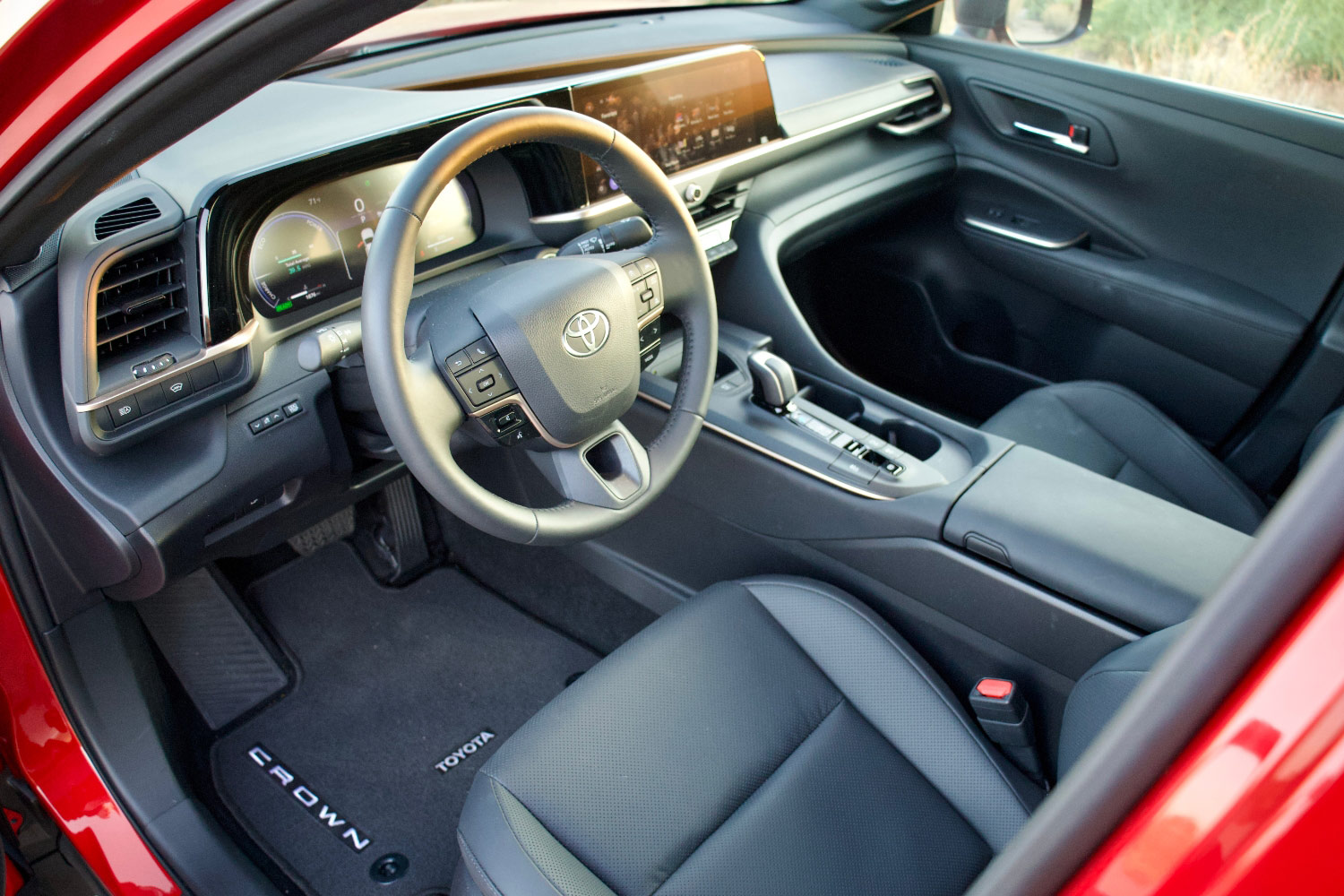 Jim Resnick
Jim Resnick
Toyota Crown's Interior Design Rivals Lexus Luxury
The new Toyota Crown's overall look is one of its biggest challenges. It's neither elegant nor ugly, but it's in no way distinctive, and that's the crux: It's derivative. A slightly furrowed brow up front reminds the eye of recent Accords. The gaping lower grille appears downright piscatorial. The side windows' shape from sill to roof evokes the Jaguar XJ sedan. Dimpled channels that seem like panel gaps utterly mar the generic rear end.
In addition, the quizzical black cladding across the front and rear doors summarizes the exterior as an arbitrary collection of influences and cues. Extending the 9 inches of stainless brightwork missing around the rear quarter window would have at least completed something. The Crown's exterior is curious yet bland, a yawning miss for the top of the Toyota four-door range. And the available two-tone paint treatment is nothing short of mystifying.
Inside, the story could not be more different. Overall, the fit and finish smacks of Lexusness. The leather, the stainless trim, and the soft-touch rubberized plastic all more than fit the premium supposition of the Crown. If the stylized "T" on the steering wheel were a stylized "L," no one would question it; this could easily be a Lexus ES 350 interior. It's also very peaceful inside, even on rough road surfaces.
In addition, the driver's seat is a rewarding place to watch the scenery go by. Leather seats are standard in the Limited model, as are heating and ventilation for the front seats, which have three intensity levels. And those seats provide far more than regular fore-aft travel and adjustment. The steering wheel rim is a pleasure to hold, too. It's generously thick and wrapped in leather.
The center console between the front seats feels enormous, though. Tall and wide, it gobbles up space, making the Crown feel slightly less spacious up front than a Camry. But it also offers plenty of storage space.
The transmission shift lever is fully electronic and works almost identically to that in the Toyota Prius. The only difference is that the Crown's transmission is sluggish to engage when toggling between gears, as when jockeying for a spot in a tight parking lot. Secondary controls such as the trip odometer reset, gauge brightness, windshield heating element, and automatic high-beam headlight engagement are off to the driver's left on the dash, a familiar placement for Toyota drivers and reasonably well-marked for the rest of us.
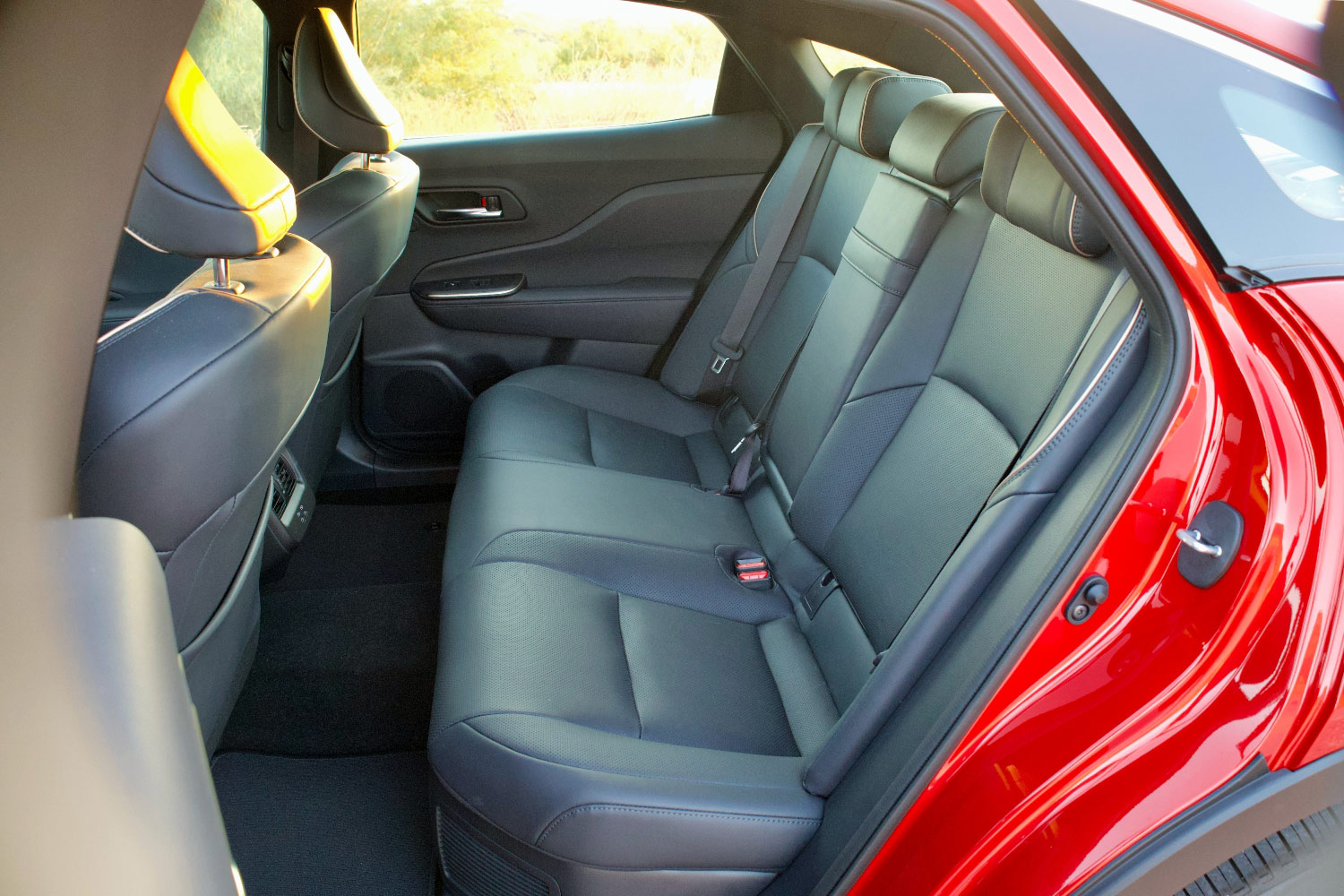 Jim Resnick
Jim Resnick
Life in the rear seat is just fine, but not quite limo-like. The Crown offers adequate rear legroom, although at 38.9 inches versus the Camry's 38.0 and the Honda Accord's 40.8, it could be roomier, given the perceived size of the Crown. The glass sunroof's shade can scroll open and closed, but the fixed glass does not tilt or slide. And the rising window sills on the rear doors don't cause claustrophobia, but they don't entirely alleviate it, either.
Toyota's big argument for the Crown's raised ride height is the ease of entry and exit compared with a typical car. I get into and out of far more than my fair share of vehicles every month, from pickup trucks to sports cars to a surfeit of SUVs. The Crown is no easier to enter or exit than your average sedan. The front seats' higher positioning might give a slightly more commanding view outside, but I can't otherwise confirm a benefit.
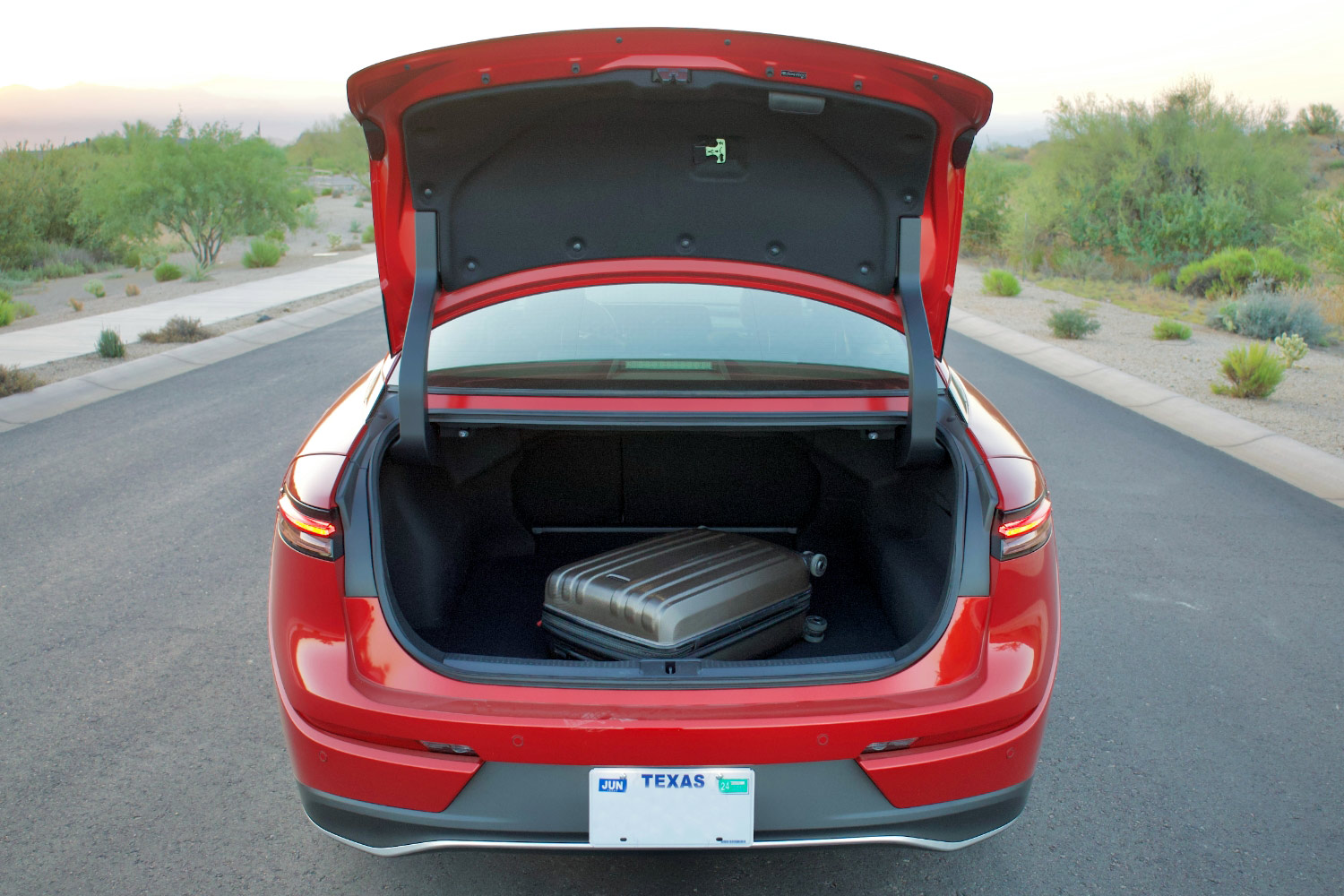 Jim Resnick
Jim Resnick
Cargo space in the trunk is adequate at 15.2 cu-ft. The Honda Accord offers 16.7 cu-ft, and Toyota's own Camry offers 15.1 cu-ft, a statistical distinction without much difference. The Crown's rear seats fold completely down, making it easy to stow longer objects.
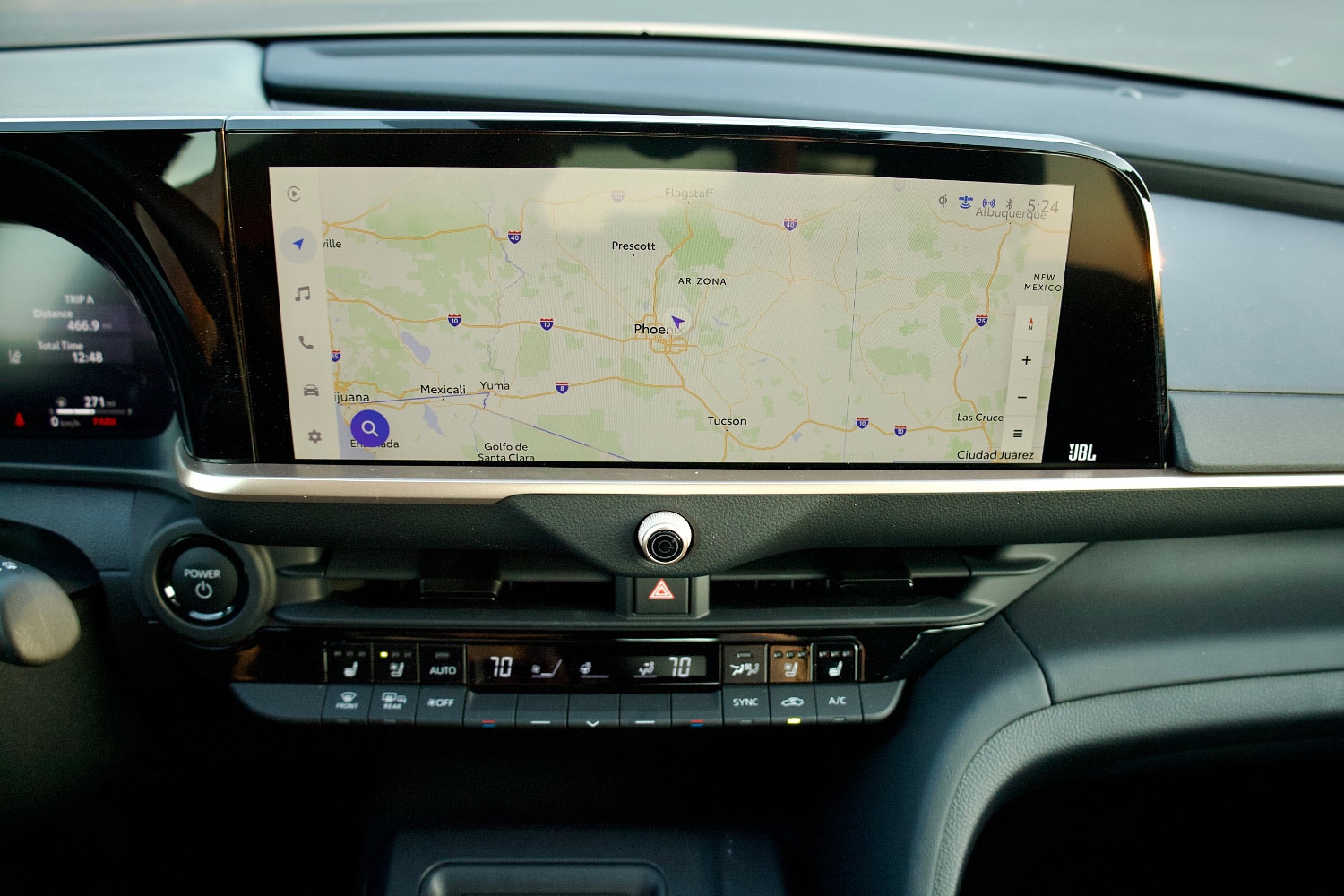 Jim Resnick
Jim Resnick
Voice Recognition and Safety Top Tech Checklist in the Crown
Every Crown trim level has the same 12.3-inch Toyota Audio Multimedia infotainment system. This new breed of display from Toyota does away with a Home button in favor of categories or main menu tiles to the left of the display to access navigation, audio, communications, and vehicle settings. It also includes a native cloud-based navigation program, should you prefer not to use your smartphone's app. However, Apple CarPlay uses the whole screen, so the left menu items disappear. You must switch out of CarPlay to bring back the native Toyota menu buttons.
Pairing my Apple smartphone through CarPlay took much longer than other recent test vehicles from other brands. Once paired, the system recognizes returning smartphones and syncs up quickly. My Limited-trim Crown also featured a standard wireless smartphone charging slot, one USB-A port, and four USB-C ports.
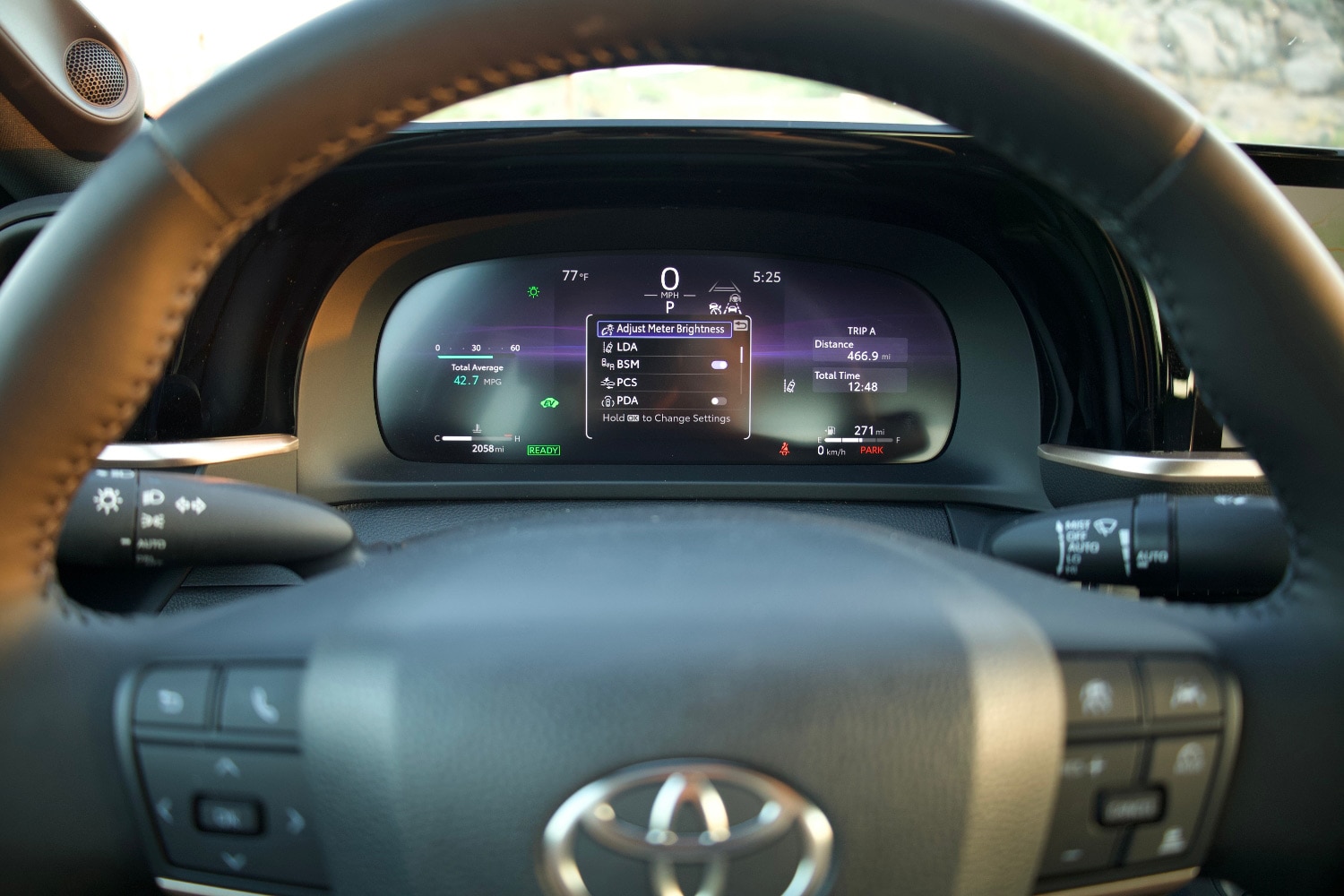 Jim Resnick
Jim Resnick
Toyota's Drive Connect subscription service plan enables the Intelligent Assistant voice recognition system. For voice control, tap the steering-wheel voice button or wake the assistant by saying "Hey, Toyota" or something similar. Then, you can request directions, a radio station, a control adjustment, and so forth. The display also retains a conventional rotary knob below the screen to toggle through selections.
During my evaluation, the voice control was a trifle slow to respond, but it worked well. For example, you can ask it to find restaurants by cuisine type and not just the proper name, and it then lists several locations in that category from which you can choose. You can also state, "I'm cold," and the system will raise the climate-control temperature and fan speed.
The Crown has Toyota Safety Sense 3.0 (TSS 3.0), equipping the car with numerous advanced driving-assistance systems. They include adaptive cruise control, forward-collision warning with pedestrian detection, automatic emergency braking, lane-departure warning, lane-keeping assist, lane-centering assist, automatic high-beam headlights, and traffic-sign recognition. In addition to TSS 3.0, the Crown includes blind-spot monitoring and rear cross-traffic alert.
Once you've set the adaptive cruise control and lane-centering assist systems on the freeway, the semi-autonomous driving aids perform well. However, TSS 3.0 does not provide hands-free driving-assist technology. Keep your hands off the wheel for about 10 seconds, and a glaring red warning to retake control will light up in the instrument cluster.
The TSS 3.0 collection also includes Proactive Driving Assist, which works whether the adaptive cruise control is active or not. The system blends existing features to slow the car down for decelerating traffic ahead, curves on a road or freeway, and in other situations. This feature can be inconsistent, though, and I found it annoying, but only sporadically so.
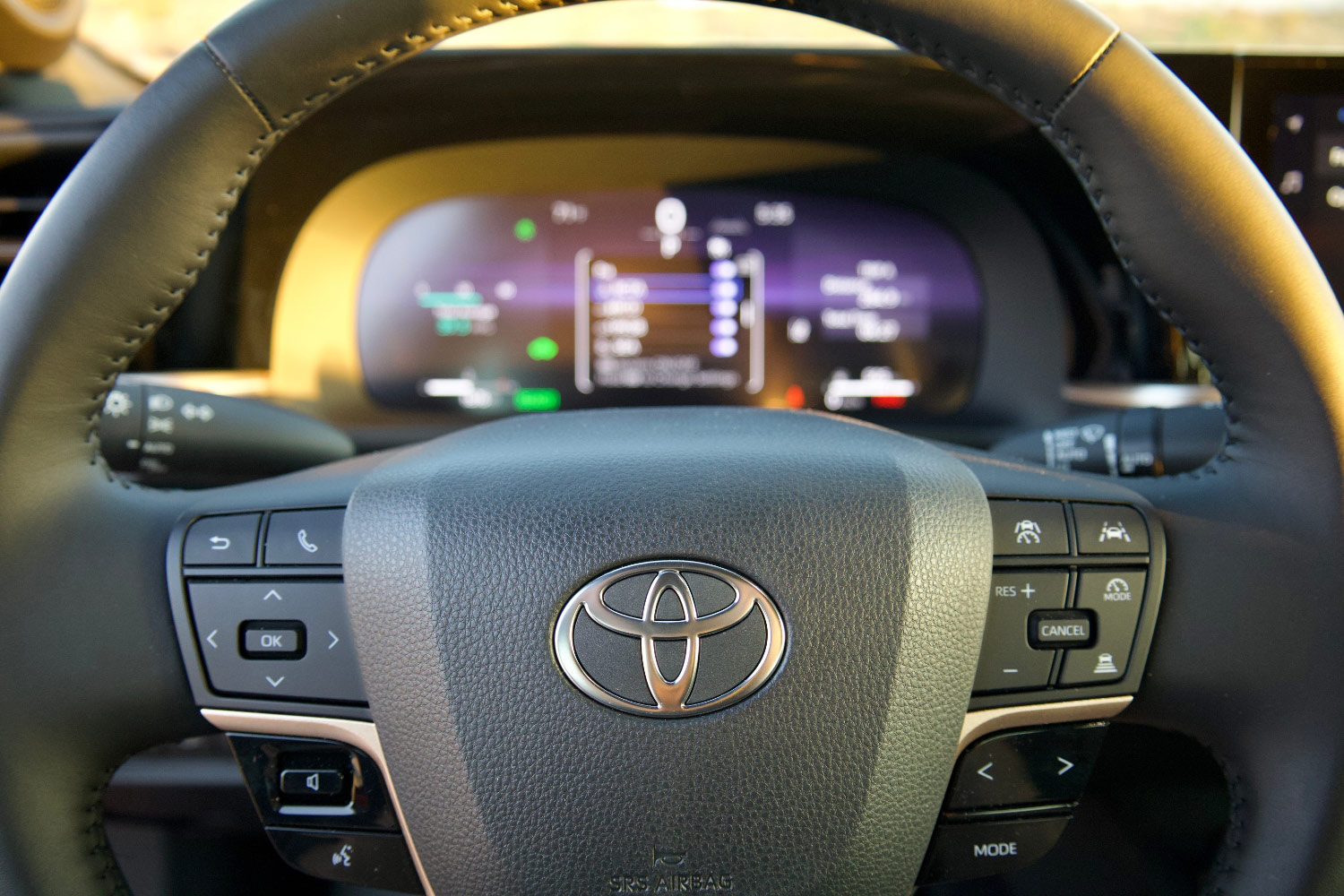 Jim Resnick
Jim Resnick
You can turn Proactive Driving Assist off if you'd prefer not to use it. However, I found the steering-wheel switches to adjust system settings using the small multifunction display in the instrument panel less intuitive than the rest of the interior controls. And when you do tee up a change to the display or a function within the display, you only have a few seconds to execute your selection before the display reverts to its prior status.
The Crown Limited's standard 11-speaker JBL audio system delivers adequate sound and clarity. However, other recent Toyota test vehicles with similar midgrade audio systems outperformed the Crown's components with better high-frequency definition, superior sound staging, and bass that becomes drowned out less with increasing road speeds and surface roughness.
Lastly, at $2,950, the Advanced Technology Package is priced high for what it offers. It includes 21-inch wheels (having nothing to do with technology), a 360-degree surround-view monitoring system, and a smartphone-enabling digital key, all of which seem far less dear than the nearly $3,000 Toyota charges.
As of this writing, neither the National Highway Traffic Safety Administration nor the Insurance Institute for Highway Safety have given the Crown safety ratings.
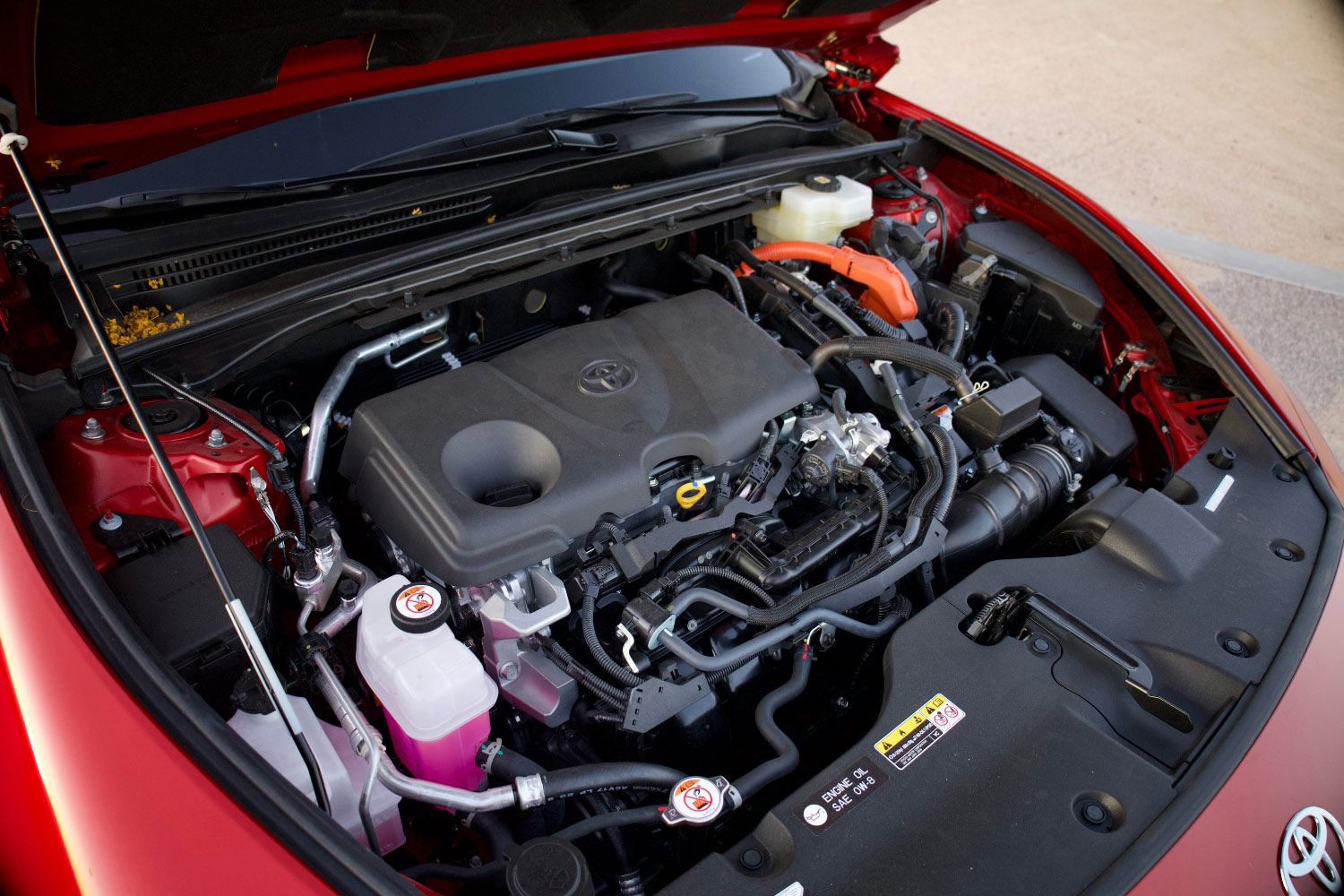 Jim Resnick
Jim Resnick
The Crown Deftly Accomplishes Mission of Ride Comfort
Toyota builds the new Crown exclusively with hybrid powertrains. The Crown XLE and Limited use a naturally aspirated 2.5-liter four-cylinder engine paired with synchronous electric motors to generate a total system output of 236 horsepower. Toyota bases the Crown Platinum's Hybrid Max system on a turbocharged 2.4-liter four-cylinder, generating 340 combined horsepower. I did not evaluate a Crown with the Hybrid Max drivetrain.
The Crown XLE and Limited hybrid system uses a continuously variable transmission (CVT), three electric motors, and an AWD system that engages the rear wheels only when necessary to maintain traction. Up to 80% of the drivetrain's power can go to the rear wheels if needed. Toyota's official stats claim acceleration to 60 mph takes 7.6 seconds.
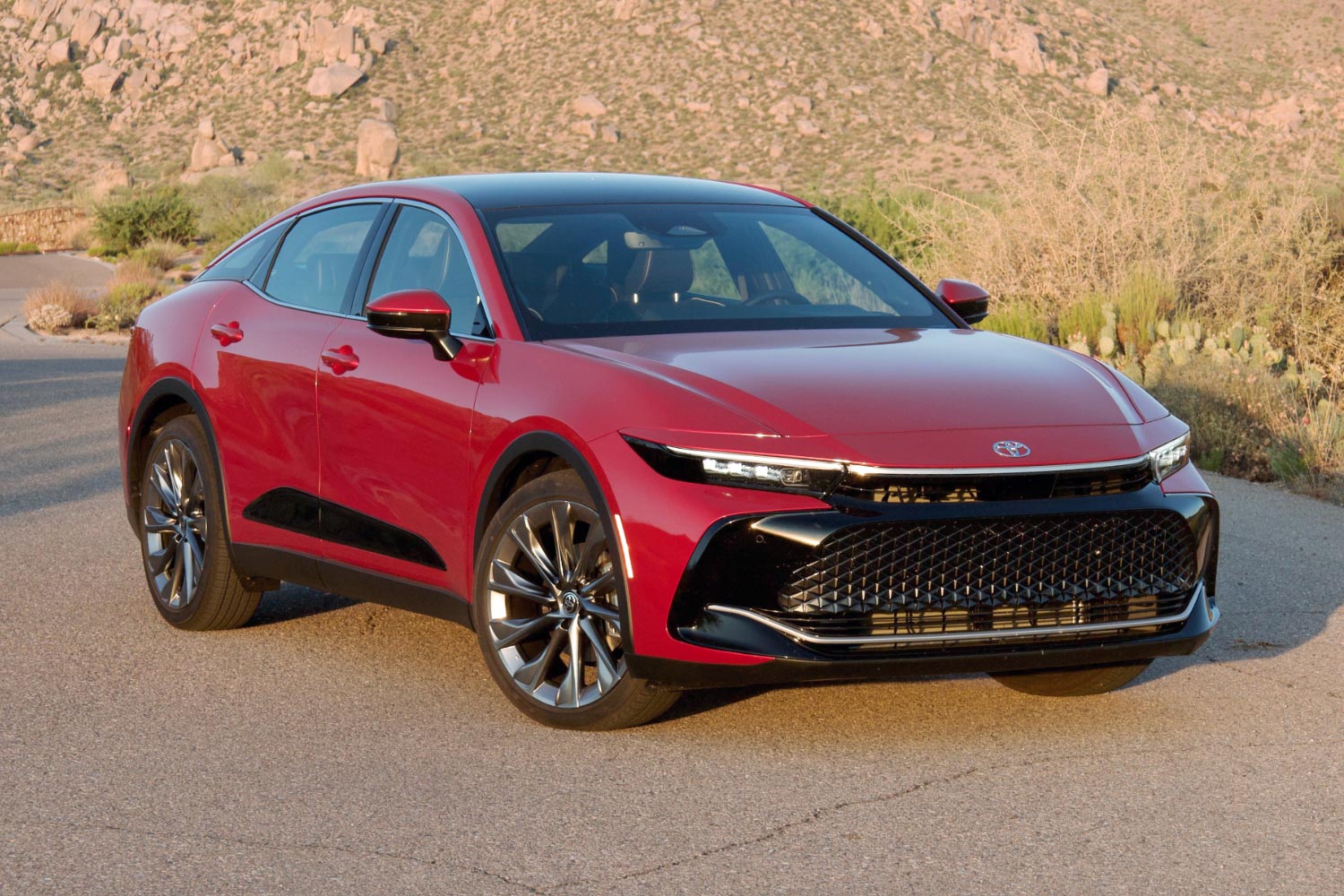 Jim Resnick
Jim Resnick
While my Crown Limited test car responded immediately to a push on the accelerator pedal, that's only one part of the equation. The actual acceleration is merely modest, and that's because the nearly 4,000-pound Crown is a lot of mass for 236 horses to move. It doesn't protest under the duress of hard acceleration and it's not nearly as boisterous as some other modestly powered cars equipped with CVTs. Instead, it's just slightly overmatched. Once up to speed, the powertrain recedes into the background, and the peaceful nature of the Crown takes over, even at highway speeds.
The upside to the downside of leisurely acceleration is efficiency. While the EPA rates the Crown Limited at 41 mpg, the car returned 42.3 mpg on my 73-mile loop of mixed urban, suburban, and highway driving. That's impressive, especially since the triple-digit Arizona weather required me to set the air conditioning to hyperfreeze over the entire test period.
Toyota engineered the Crown with new structural elements beyond the modular platform on which it's based. It also fitted the car with a unique multilink rear suspension and specific springs and shocks devoted to the Crown's mission. That mission is ride comfort, even at the expense of agility, and the Crown delivers an exceptionally smooth ride despite the small sidewalls on those large 21-inch tires.
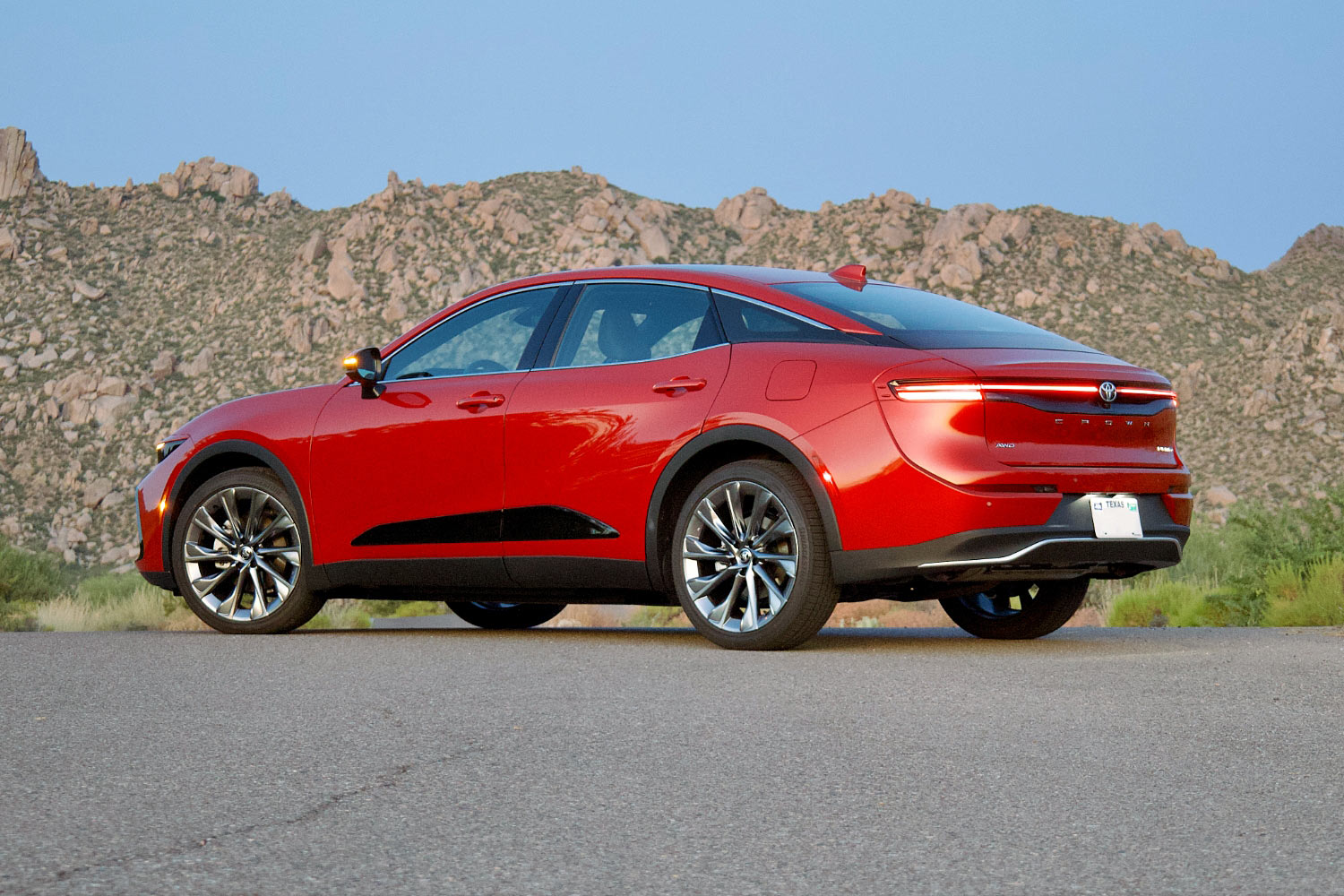 Jim Resnick
Jim Resnick
It's often forgotten that tires are part of a car's suspension and that low-profile (or short sidewall) tires can give a quick and lively steering response. But they can also cause added impact harshness over bumps and potholes and create noise over poor road surfaces. No one will mistake the Crown for a sports car, and predictably, it handles more like a comfortable sedan than some competitors yet generates acceptable grip through the twisty bits. Still, you feel the heavy steering and the compliance more prominently because Toyota bakes a soft, smooth ride into the car at the skeletal level.
The Crown Limited also provides adjustable drive modes. Choose Sport to quicken throttle response or Sport+ to adjust the Limited's swing-valve shocks. Overall, though, Toyota got the shock damping and spring rates right for the type of vehicle the Crown is.
Braking performance is excellent and never falters, even when you ask silly things of the Crown. There is a slight peppering of hybrid regenerative-braking feel, however. It's not so bad that coming to a slow, precise stop isn't possible, but it does require concentration.
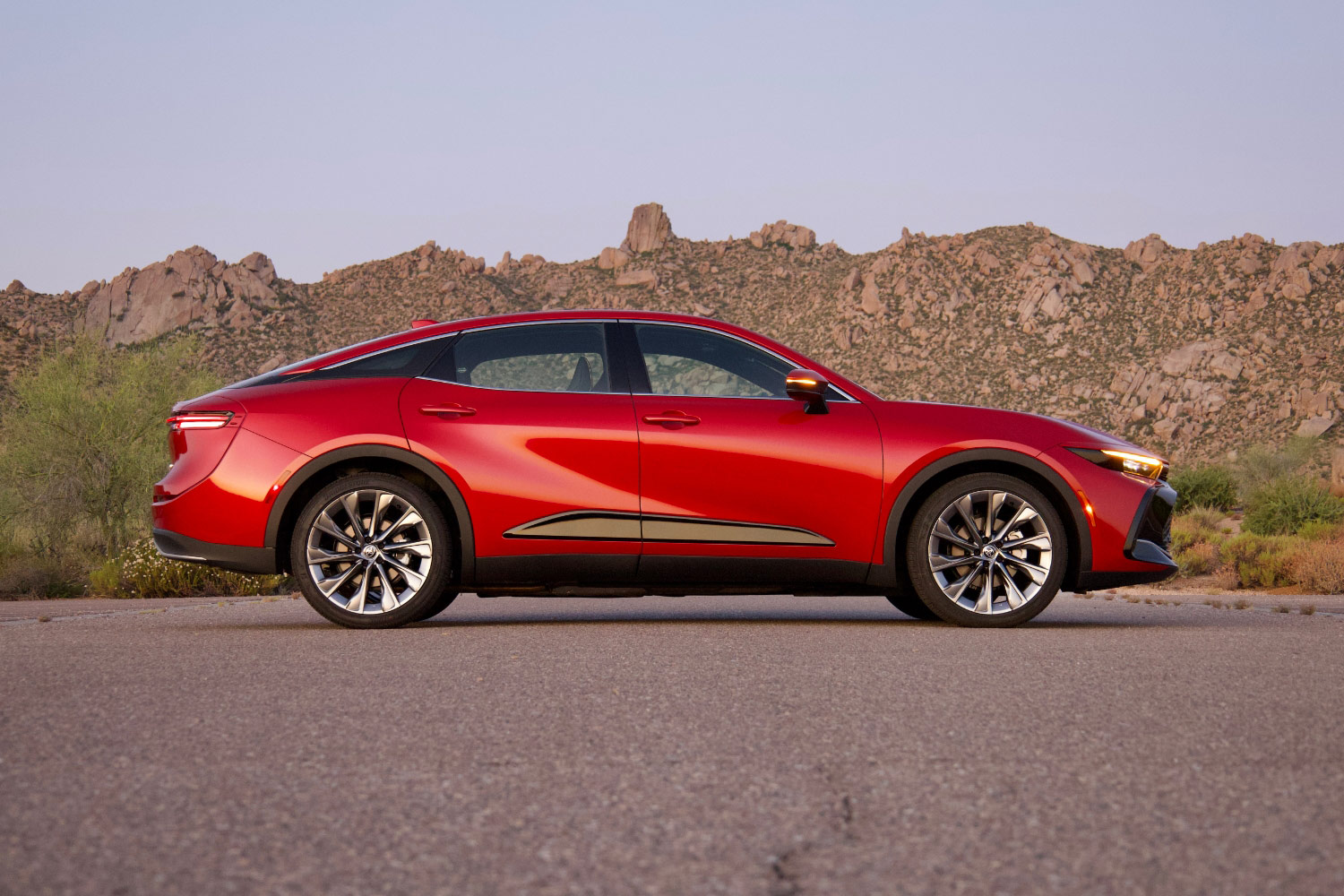 Jim Resnick
Jim Resnick
Is the 2023 Toyota Crown a Good Car?
The new Toyota Crown does about 90% of what it promises without flaw. It gives you a pleasant ride, provides exceptional quietness, and delivers excellent fuel economy. It has numerous safety features, and the interior demonstrates impressive build and materials quality.
However, it's off in the netherworld on exterior design with a few downright befuddling style choices. And the lifted sedan notion doesn't seriously compel consideration, especially when other ejected players like the long-gone AMC Eagle as well as the Honda Accord Crosstour, Subaru Outback sedan, and Volvo S60 Cross Country sedan already proved the concept's limited market viability. And as crossover SUV sales continue to climb in 2023, sedan sales continue to decrease.
There's little that's distinguishing in the Crown. It offers no more real room inside than a Camry. It might be taller and come with AWD, but ground clearance is no greater than most midsize sedans (and measures less than the Subaru Legacy), so off-roading is out of the question. And while it returns good fuel economy, the Crown's numbers are slightly shy of the discontinued Avalon Hybrid's average rating of 44 mpg.
Toyota informed me that its focus groups showed great interest in a high-riding hybrid sedan with AWD and the other Crown features. So, the proof will be in the sales pudding, guv'nor.
Written by humans.
Edited by humans.
 Jim Resnick
Jim ResnickFrom racing exotic sports cars, to ranking new cars, to peeling back layers of cover up in an exhaust emissions scandal, Jim has chronicled the automotive sector for decades. Jim has also worked inside the corporate headquarters of three carmakers, and therefore understands how the automotive sausage is really made. But Jim’s affinity for vehicles takes a back seat to finding the truth and the cultural implications of modern transportation. He has also lectured at universities to engineering and policy students and faculty on the industry’s relationship with legislation in the wake of the diesel exhaust emissions scandal several years ago. Put simply, Jim reports on autos, mobility, tech, car culture, and the traffic jam of topics within.
Related articles
View more related articles